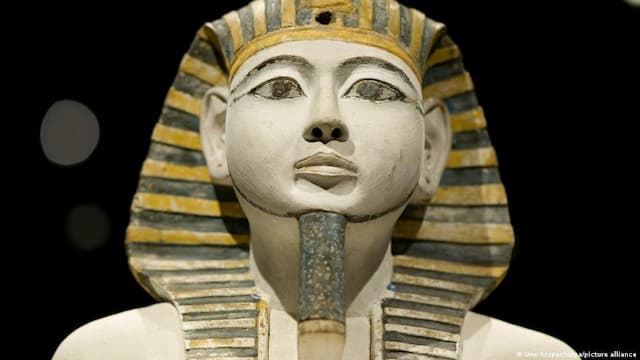Why was Jesus Accused of Blasphemy? (Matthew 26:59–66)

“Speak against me, and you speak against God!” That kind of manipulation is common from cults to Catholicism, from micromanagers to megachurches. That’s what motivated Caiaphas to tear his garments at Jesus’ trial with the accusation, He blasphemed! (26:65)
Blasphemy was a capital crime (Leviticus 24:16), so it was a convenient charge for a court that was seeking malicious witnesses against Jesus so they could put him to death (26:59). The Book of the Covenant places blaspheming God in parallel with cursing the ruler of your people (Exodus 22:28).
Matthew invites his audience to consider who is really the leader of God’s people here. Is it the God-anointed king who rode into Jerusalem acclaimed as the descendant of David … arriving in the name of the Lord (21:9)? Or is it the high priest, descendant of Aaron, appointed by God over his house and holding real power in Jerusalem?
The two authorities appointed by God
Conflict between the two leaders began with the very first king. In his impatience, Saul took the priestly role for himself, and Samuel the prophet/priest declared him sacked by God for overstepping the boundary (1 Samuel 13:8-14).
Both roles ceased when Jerusalem fell in 586 BC. Seventy years later, they built a second temple and installed a high priest named Joshua. There was no chance of installing a king while Persia ruled them, so they gave the title governor of Judah to Zerubbabel, a descendant of King David (Haggai 1:1, 14; 2:2, 21).
The Book of Zechariah was all about the restoration of the two offices that represent God’s authority on earth. If the people will return to God (from exile), God promises to return to them, (Zechariah 1–2). As the temple is dedicated, Zechariah describes the ceremonial cleansing of the high priest who is then able to intercede for his people (Zechariah 3).
But that’s only half the story: God had appointed two leaders to support the lamp of divine authority on earth, the two who are anointed to serve the Lord of all the earth (4:14). Zerubbabel is instructed not to try to overthrow Persian rule, for God himself would restore the kingship for them: This is the word of the Lord to Zerubbabel: ‘Not by might nor by power, but by my Spirit,’ says the Lord Almighty (4:6).
God had already promised that God would restore a Branch from David’s dynasty as king (e.g. Isaiah 11:1; Jeremiah 23:5). But how do they manage in the meantime? God instructed Zechariah to make a literal crown, place it on the high priest’s head, and declare him as the Branch: both roles unified in one person (Zechariah 6:9-13).
That was the interim arrangement until the promise to Zerubbabel was fulfilled. The kingship would be restored. Jerusalem would rejoice to see your king comes to you, righteous and victorious, lowly and riding on a donkey (Zechariah 9:9).
But when that day finally came, the king found the high priest unwilling to relinquish the crown his office had held for 500 years. He went to the temple and declared it a den of robbers. With murderers controlling the temple (Matthew 23:29-36), the city that refused her king would fall (23:37-39). The siege would mean great suffering for his people (24:15-21), but the son of man would still receive the kingship through heaven’s support (24:30-31), accomplishing in that generation all that God had promised (24:32-34).
This is the unified story Matthew is telling, the story of how God’s anointed became king by divine appointment, despite being rejected by the leaders of God’s people. They paid bribes, arrested him by stealth, sought malicious witnesses, and found him guilty of blasphemy on the grounds that he claimed to be God’s anointed.
In their Law, anyone who falsely claimed to speak by God’s authority was blaspheming since they were misusing the Name (Deuteronomy 18:20). In the context of the kingdom, the major case of blasphemy was the Assyrian commander’s boast to be superior to God’s authority, his deceptive claim to speak and act for God (2 Kings 18:22-25; 19:6, 22). In the Maccabean period, that same accusation was levelled at Antiochus Epiphanes and his supporters (1 Maccabees 2:6; 7:38, 41. 2 Maccabees 8:4; 9:28; 10:4, 34-36; 12:14; 13:11; 15:24). By Jesus’ time, claiming to be a leader appointed by God under false pretences was understood as blasphemy.
Conclusion
Matthew leaves us with no doubt that the issue was one of authority — the conflict between the king and the temple. The malicious accusation on which he was condemned was that he spoke against the temple: This fellow said, ‘I am able to destroy the temple of God and rebuild it in three days.’ (Matthew 26:61)
So, which authority was representing God and defending God’s honour in this case? The high priest, or the anointed king? Which authority would God back? The king God sent to restore the kingdom of God? Or the high priest who would kill to keep the crown?
The Good News according to Matthew is that one of them ends up receiving all authority in heaven and on earth (28:18).
Open Matthew 26:57–68.
What others are saying
R. T. France, The Gospel of Matthew, NICNT (Grand Rapids, MI: Eerdmans, 2007), 1029:
Darrell Bock, in applying his massive study of blasphemy to the condemnation of Jesus, concludes that this was the main focus of the charge, but he also goes on to suggest a secondary element of “cultural blasphemy” which added to the offense. Blasphemy included speaking and acting not only against God but also against his temple and his appointed leaders in Israel (note Exod 22:28). The record of Jesus’ teaching and actions in Jerusalem has provided ample evidence of both these offenses, and his climactic declaration in v. 64 has been directed against the members of the Sanhedrin (“you”), over whom he now claims the ultimate sovereignty. This was at least undiplomatic, but according to Bock it also contributed to the overall charge of blasphemy.
Related posts
- “Tell us if you are the anointed ruler” (Mat 26:57–68)
- Why did Jesus have to die? (Mat 26:47-56)
- Unjustly struck down (Mat 26:31-35)
- What’s the unforgivable sin? (Mat 12:30-32)
- Acknowledging Jesus as Lord (Mat 7:21-23)
- How Jesus overcomes the world’s power problem (John 12–18)
Seeking to understand Jesus in the terms he chose to describe himself: son of man (his identity), and kingdom of God (his mission). Riverview College Dean
View all posts by Allen Browne










